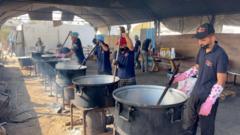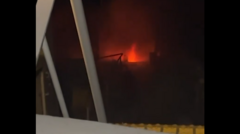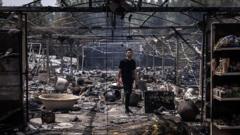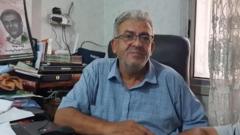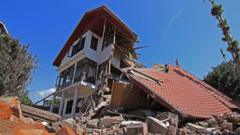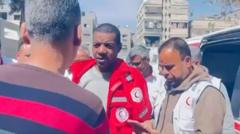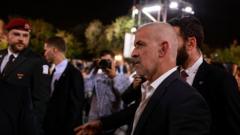Palestinian refugee Jumaa Zawayda recounts his harrowing experience of being displaced from his home in Jenin, amidst Israel’s operations targeting armed groups. As demolitions rise and information access diminishes, the local community grapples with immense uncertainty and loss.
"Facing Displacement: The Devastating Impact of Israeli Military Operations in West Bank Refugee Camps"
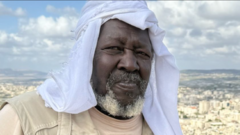
"Facing Displacement: The Devastating Impact of Israeli Military Operations in West Bank Refugee Camps"
As Israeli military campaigns intensify in the West Bank, many families are forced from their homes, struggling to hold onto remnants of their past lives.
Jumaa Zawayda, a 66-year-old Palestinian, found himself battling tears as he stood on a hill overlooking his neighborhood in the Jenin refugee camp. After Israeli forces directed the camp's 20,000 residents to evacuate, Jumaa stood firm, determined to protect his home from damage amid the chaos. This situation spiraled into a nightmare that would see him and many others facing the prospect of indefinite displacement.
Over the course of three distressing days marked by the sound of gunfire and explosions, Jumaa’s hope gradually faded. The Israeli military had intensified its operations to counter armed groups operating within the camp, issuing evacuation orders and disrupting essential services like water and electricity. Ultimately, Jumaa found himself in a makeshift shelter, sharing space with other displaced families, unable to return to his home.
Despite efforts by Israeli forces to limit information about the fate of homes in the camp, Jumaa held on to fragments of hope. Three months later, he climbed to a vantage point to survey potential destruction, passing along stories from neighbors who feared their buildings had been razed. While he managed to recover his dog and refugee ID card, his heartbreak over possibly losing his home weighed heavily on him.
Israel's sustained military campaigns have been taking place since before the recent Gaza conflict, targeting groups like Hamas and Palestinian Islamic Jihad that operate within confined urban areas. The ongoing operations have resulted in the significant demolition of properties—over 800 apartments are estimated lost, with 42,000 individuals displaced since the start of renewed hostilities.
Israeli Defense Minister Israel Katz has labeled refugee camps “nests of terror,” justifying continued demolition actions and restrictions on residents, citing security concerns. Yet, to many displaced individuals like Jumaa, the government's justification does little to ease the pain of losing years of labor and community connections.
Aid organizations underscore a stark reality; the current situation has incited the largest forced displacements seen in decades, overshadowing any prior humanitarian crises unearthed by the ongoing Israeli-Palestinian conflict. Jenin’s Mayor Mohammad Jarrar articulated the dire conditions his constituents face—a complete dismantling of services and infrastructure amid escalating violence.
In March, Jumaa was offered a limited window to return to his residence. Accompanied by heartache and memories, he collected his ID and dog, but later found that his home was one of those marked for demolition. As confirmed through satellite imagery, reality struck hard: many structures, including his own, lay in ruins long before access was allowed.
In a world fraught with conflict, Jumaa’s resilience shines through. “I will rebuild my home, whether in a tent or wherever necessary,” he declared with unwavering resolve, highlighting the harsh irony of displacement faced by his family—once uprooted in 1948, now facing the specter of displacement anew.



